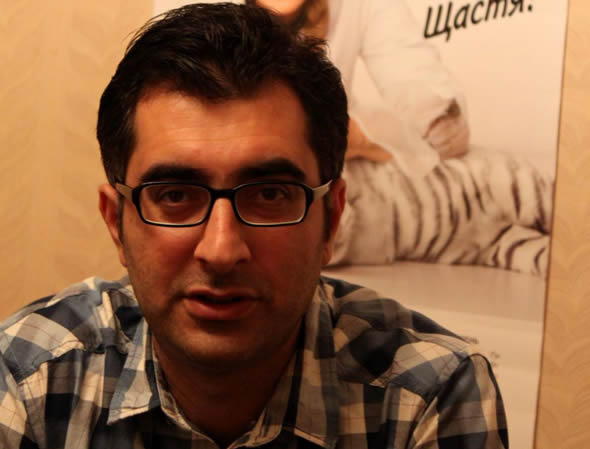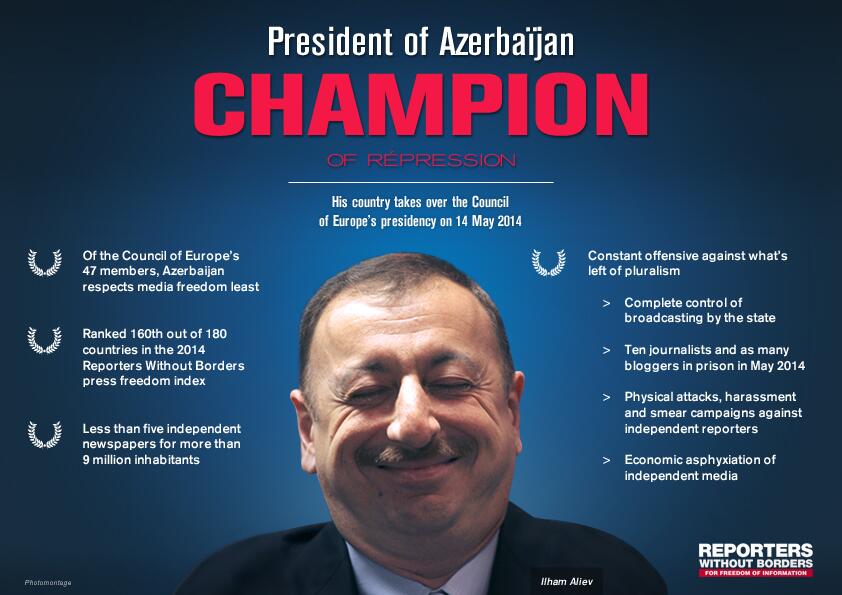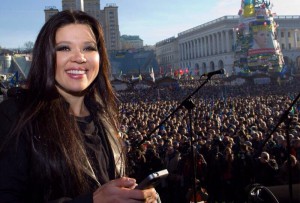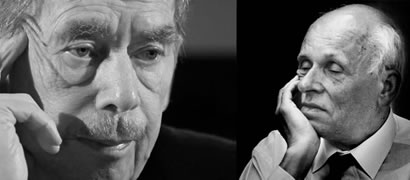Azerbaijani human rights activist and defender of the right to free and fair elections, Anar Mammadli, is the 2014 winner of the Vaclav Havel Prize.
This is a promising, fair, and even courageous decision by the jury members in charge of awarding this prize, for it also highlights a dramatic failure – by the very institution on whose behalf this prize is awarded, the Council of Europe (CoE).
It is imperative that the Council of Europe act now, following this strong signal. At the very least the following should happen immediately:
- All activities of the Azerbaijani chairmanship of the Council of Europe should be boycotted or suspended until Anar Mammadli (winner of the 2014 the Havel Prize winner) and Ilgar Mammadov (former chair of Council of Europe School of Politics and, according to ECtHR, a political prisoner) are released. It is unacceptable that a Council of Europe chair is under serious suspicion of systematic repression.
- The secretary general of the Council of Europe should appoint a panel of respected European judges to examine the list of Azerbaijani political prisoners and reports by eminent human rights organisations, and report back to the Committee of Ministers (CoM) of the Council of Europe and to PACE with their findings.
- Members of the Committee of Ministers in the CoE should sternly warn Azerbaijan about its treatment of prisoners, and demand full and unconditional cooperation with international monitors, including full access for outsiders to visit prisoners, given the serious allegations of abuse.
Awarding Anar Mammadli with the Vaclav Havel prize is a strong signal and critical first step. But without further action by the Council of Europe, handing out an award is meaningless – and will definitely not save this institution’s soul. Recent months and this award have also made it obvious just how far the Committee of Ministers, PACE, and the Secretariat have diverged from their original mission to protect and ensure human rights.
The time to correct this is now.

Background on why the Havel Prize 2014 was given to the right person
In recent months, it has become obvious that the Azerbaijani government has decided to finish, once and for all, any opposition in the country.
New NGO laws make the critical work of civil society organisation impossible. Dozens of NGOs have had their bank accounts frozen, including those with grants by the European Union. Staff members of human rights organisations are in prison, in hiding, or expecting criminal charges. International organisations such as Transparency International, Open Society Foundations, NED, NDI, IREX, etc. have not been spared in this onslaught. Reports and accounts of torture in jails are multiplying. Monitoring mechanisms have long since broken down. Recently, a UN team sent to investigate cases of torture had to cut its visit short due to obstruction by the Azerbaijani authorities.
It is obvious that the Aliyev regime expects to get away with all of this, emerging unscathed. The government in Baku ignores the occasional complaints, viewing them as no more than a nuisance, (a non-binding resolution in the European Parliament here, another report or statement from an NGO there). Azerbaijan’s government rests assured that when senior officials from Western Europe and the United States come to visit, the issue of human rights remains very low on their agenda.
In this regard, the failure of the mechanisms within the Council of Europe is particularly disheartening. Ever since PACE rejected the January 2013 resolution on political prisoners in Azerbaijan (See: Azerbaijan debacle: The PACE debate on 23 January 2013), all dams have burst:
- There were the arrests of NIDA activists in 2013, who were detained for protesting violence against conscripts in the military. The young activists were sentenced to jail-terms of up to 8 years – on the very day Azerbaijan assumed the chairmanship of the Council of Europe in May 2014. (See: NIDA’s “Live not by Lies” Baku Court Speech – May 2014)
- There was the arrest of Ilgar Mammadov, who was head of the Council of Europe School of Politics at the time of his arrest. Mammadov was sentenced to 7 years in prison in March this year. The fact that his case has been identified as a politically motivated by the ECtHR has not made any difference.
- There was the arrest and sentencing of Anar Mammadli, the former advisor of the rapporteur on political prisoners, arrested just before the UK Foreign Secretary arrived in Baku in autumn 2013.
- Then this past summer came the arrests of Leyla Yunus and Rasul Jafarov – the very people who coordinated Azerbaijan’s civil society to draw up a comprehensive list of political prisoners – despite the risk and despite lack of support from the Council of Europe. Almost immediately after releasing this list, Leyla, her husband, and Rasul were all arrested. (The list is a document of shame: www.esiweb.org/thelist)
These prominent arrests are only the tip of an iceberg. The government is blackmailing activists and journalists with sex tapes, pressuring their family members (who end up losing jobs or are threatened with arrest themselves), illegally seizing files related to cases brought to the ECtHR, and intimidating and threatening the few remaining lawyers who still take on political cases. And all of this is happening while Azerbaijan holds the chairmanship of the Council of Europe.
Additionally, PACE appointed Spanish PP member Pedro Agramunt as the new rapporteur on political prisoners. Agramunt is a man who has solidified his reputation as an apologist for the government in Baku, speaking out and voting against the adoption of a standard definition of political prisoners, presented in 2012. (See: Showdown in Strasbourg: The political prisoner debate in October 2012). Agramunt also voted against a January 2013 resolution that would have addressed the issue of political prisoners in Azerbaiijan — a resolution that Anar Mammadli helped prepare. The appointment of Agramunt as rapporteur on political prisoners in Azerbaijan adds insult to injury. (See also: A Portrait of Deception. Monitoring Azerbaijan or why Pedro Agramunt should resign).
A debate on the recent wave of repression has emerged within the Committee of Ministers recently. However, there has been no serious reaction by member states in the CoM or by the secretariat. It seems that everyone is waiting for the end of the Azerbaijani chairmanship, hoping that by then the limited interest in Azerbaijan’s human rights record will dissipate completely.
Perhaps the government will even release one or two political prisoners (its carousel policy), and claim that the “mechanisms” of protection are indeed working. However, as long as the Aliyev government is allowed to continue its repression, it may eventually succeed in destroying one of the most courageous human rights movements in Europe. Furthermore, with the 2015 parliamentary elections – and another corrupt and unfair electoral process – the authoritarian consolidation will have been completed.
Will awarding Anar Mammadli the 2014 Vaclav Havel prize mark the point at which the Council of Europe becomes aware of what is actually occurring – the capture of an established European institution tasked with protecting human rights – and start changing? One can only hope so.

More reading on this crisis:
- ESI newsletter: Andrei Sakharov and the defence of the unjustly persecuted (23 September 2014)
- Leyla Yunus, Rasul Jafarov, Intigam Aliyev – Candidates for the European Parliament Sakharov Prize 2014
- Anar Mammadli – Shortlisted for the Council of Europe Vaclav Havel Prize 2014
- Briefing: The jails of Azerbaijan – A chronology of recent repression by the chairman of the Council of Europe
- ESI conference in Berlin on 2/3 June: “Towards a Europe without political prisoners”
- Council of Europe secretary general Thorbjorn Jagland publishes op-ed: “Council of Europe is not blind to Azerbaijan’s rights violations” (22 May 2014)
- op-ed on Azerbaijan and the Council of Europe in Frankfurter Allgemeine Sonntagszeitung: Politische Gefangene? Hier doch nicht! – (Political Prisoners? Certainly not here!) (18 May 2014)
- ESI at conference in Oslo: Safeguarding international institutions against authoritarian abuse (13 May 2014)
- Rumeli Observer: NIDA’s “Live not by Lies” Baku Court Speech – May 2014
- Rumeli Observer: The Cat and Mouse principle and the visit by Mr. Jagland in Baku (5 May 2014).
- Open letter to 125 current and former members of the Parliamentary Assembly of the Council of Europe (23 April 2014)
- Translations of the open letter are available in: Azeri, Bosnian/Croatian/Serbian, French, German, Greek, Italian, Polish, Spanish, and Turkish
- ESI newsletter: Hunger strike, European values and an Open Letter (23 April 2014)
- Report: Disgraced – Azerbaijan and the end of election monitoring as we know it (5 November 2013). Also available in Russian: ЗАПЯТНАННАЯ РЕПУТАЦИЯ. АЗЕРБАЙДЖАН И КОНЕЦ ПРИВЫЧНОГО ДЛЯ НАС НАБЛЮДЕНИЯ ЗА ВЫБОРАМИ
- Rumeli Observer: Les Miserables in Azerbaijan? (26 February 2013)
- Azerbaijan debacle: The PACE debate on 23 January 2013 (February 2013)
- Showdown in Strasbourg. The political prisoner debate in October 2012 (February 2013)
- A Portrait of Deception. Monitoring Azerbaijan or why Pedro Agramunt should resign (22 January 2013)
- Facebook picture story: Ilham the Magician and the Council of Europe – Or: how (not) to make the problem of political prisoners disappear. A Fable in 35 Acts that can be read in 5 minutes!
- Report: Caviar Diplomacy. How Azerbaijan silenced the Council of Europe (24 May 2012)
- Report: Generation Facebook in Baku – Adnan, Emin and the Future of Dissent in Azerbaijan (15 March 2011). Also available in Azerbaijani: Bakıdakı Facebook nəsli. Adnan, Emin və Azərbaycanda dissidentliyin gələcəyi (15 Mart 2011)


